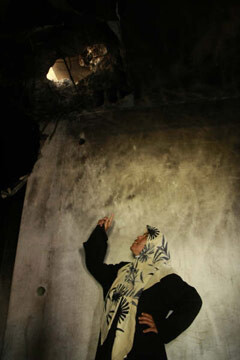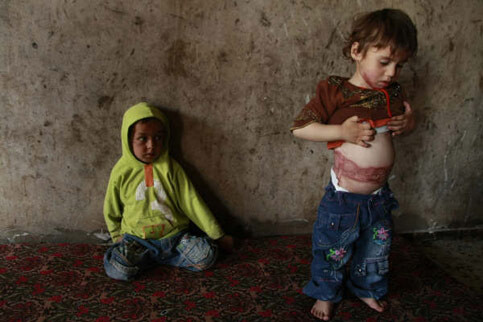25 May 2009

Umm Muhammad’s eldest son, Muhammad, holds a picture of his family. Everyone in the picture was killed except for him, Umm Muhammad and two younger brothers, Ahmad and Ali.
The Abu Halima family’s agony began when the family was taking shelter from Israeli missiles in the foyer of their two-floor home in the Jabaliya area of the northern Gaza Strip on 11 January when two white phosphorous bombs struck. The father of the family, Saad Ala Abu Halima was instantly killed along with his three sons, Abed Raheem (14), Zaid (10) and Hamza (8), along with his only daughter, one-year-old Shahed.

Umm Muhammad points to damage in the ceiling of her home from the Israeli bombing.
By the time Ghada’s husband reached the house, his brother Ahmad and some relatives had only minutes ago rushed into the house, carrying away the dead sons and their father on a cart, seeking for an ambulance help. Ahmad (Umm Muhammad’s son) said: “By the time we heard the blast, my relatives and I took my father and brothers on a cart, thinking we could save their lives. I didn’t know that they all were dead by the time we arrived! We were looking for an ambulance but an Israeli tank appeared in front of us; the Israeli soldier who got out of it ordered us to leave the bodies and run for our lives … while running away I looked back to see him pouring down sand on them.”
He added after a brief pause, “I went back home to see my niece Farah, Ali, my mother and my sister-in-law Ghada all burnt and being carried to the hospital by the neighbors. It still doesn’t seem real to me; every morning I wish that I could give anything away to get my family back. Still, God knows better than I do.”
Umm Muhammad comforted Ali, saying, “They took my baby Shahed but I still have Farah and Ali; maybe it’s just how it was meant to be.”
“I’ve lived my life, I don’t mind paying the tax of war but why should this little girl should suffer; this what I don’t understand! We managed to live in the house after the accident but the black walls keep on reminding us of it every minute of our lives, or what is left of it for that matter,” Umm Muhammad added.

Two-year-old Farah sits by while four-year-old Ali lifts his shirt to show his wounds caused by the Israeli attacks on his family’s home.
Farah’s mother and Umm Muhammad’s daughter-in-law, Ghada traveled to Egypt with Farah to get treated for her severe burns, but Ghada passed away in Egypt and only Farah returned to Gaza 20 days later.
Umm Muhammad insists that her only surviving son present during the attacks was ironically the closest to the missile’s impact. When Ali asks his younger cousin about their missing family members, Farah points towards the heavens as her grandmother had taught her.
Farah’s uncle, also named Ahmad, said, “I can see Farah, Ali and my mother are always in pain, no matter what medication they get. Doctors over here are helpless, and I bet that’s the case in any other country. Only the Israelis can get us the cure since they are the ones who caused it.”
As time goes by, the devastating magnitude of the external as well as internal wounds of this Palestinian family will become more apparent.
Eman Mohammed is a Jordanian-Palestinian freelance photojournalist and reporter based in the Gaza Strip since 2005.





